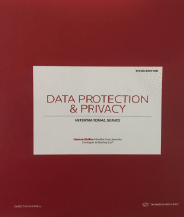Legal regime for providers of Information and Communication Technologies – ICT services

Autor : Jairo Morales Vecino
Introduction
Through Ruling C-306/2019 of July 10th of 2019, the Constitutional Court of Colombia studied unconstitutionality charges against article 55 (partial) of Law 1341/2009, the latter of which defined principles and concepts related to the society of information and the organization of the Information and Communication Technologies – ICT –, and created the National Spectrum Agency.
Article 55 of Law 1341/2009 prescribes:
“ARTICLE 55. LEGAL REGIME FOR PROVIDERS OF INFORMATION AND COMMUNICATION TECHNOLOGIES´ NETWORKS AND SERVICES. Acts and contracts, including those related to their labor regime and credit operations of Information and Communication Technologies´ providers, whatever their nature or capital composition, shall be governed by the private law regime.”
(Unconstitutionality charges filed against emphasized sentence)
Plaintiffs based their claims against article 55 of Law 1341/2009 on the understanding that, as it establishes that all acts and contracts conducted and entered into by ICT networks and service providers are governed by private law, it releases such providers from applying the principles of the administrative function as determined in articles 209 and 210 of the Colombian Constitution.

Context and nature of the charged disposition – Article 55 of Law 1341/2009
Law 1341/2009 organized the provision of ICT networks and services in the national territory. It was passed by Congress as a response to a public policy that is governed by fair competition, consumer protection, full coverage, quality of service, the efficient use of networks, etc., in order to facilitate “free access to the society of information, for all inhabitants of the national territory”.
Article 6 of Law 1341/2009 defines ICTs as the “set of resources, tools, equipment, software, apps, networks and media that allow the compilation, processing, storage and transmission of information such as voice, data, text, video and images”. On the other hand, article 55, partially accused by the plaintiffs, prescribes that a private law regime shall apply to all legal acts conducted by providers of ICT networks and services, without consideration of the nature of their capital composition (public or private).
In that sense, the Court starts to study the constitutionality of Article 55 understanding that it applies to:
- State companies, with a 100% of public funding
- Mixed economy companies where public and private funding represents at least 50% of its capital, and
- Private companies, with a 100% of private funding.
However, as the unconstitutionality charges presented by the plaintiffs rely on the alleged transgression of the principles of the administrative function owed by State and mixed economy companies, the Court based its analysis solely on ICT providers with full or 50% of public funding.
In order to solve the problem, the Court estimated as fundamental to reiterate the concept and nature of what the Colombian administrative, legislative and judicial branches have understood as administrative function, and the principles derived from it.
According to Article 209 (allegedly breached by Article 55 of Law 1341/2009) of the Colombian Constitution, the main purpose of the administrative function is to satisfy public interest, and in order to achieve such purpose it establishes the following guiding principles:
- Equality
- Preservation of public treasure
- Effectiveness
- Agility of services
- impartiality
- Publicity

Court´s Analysis
The Court declared unfounded the charges presented against Article 55 of Law 1341/2009. To do so, it first stated that the Congress of Colombia has plenty of faculties to define Colombia´s general State structure. Such faculties include:
- The design of the organisms that integrate the national administration, including their objectives and functions;
- The determination of the legal and contracting regime to be applied to public servants, and the adoption of fiscal measures;
- The definition of the essential characteristics of State entities, such as their administrative, technical and financial autonomy.
Therefore, the Court declares, it is accepted from the Constitutional perspective for the Colombian Congress to impose the legal regime that would be applied to the acts and contracts of decentralized entities, such as those companies in charge of providing ICT services.
This means that neither the provision of a public service, nor the public nature of the capital with which a company is funded, carries – necessarily – the implementation of a public law regime.
It is the Colombian Congress the competent authority to determine the legal regime that applies to both State (100% of public funding) and mixed (both public and private funding) companies in charge of providing public services.
In fact, both law (1) and jurisprudence have considered that it could be desirable for State companies to be subject to a private law regime, as it allows them not only to operate in a more efficient way, but also to keep State prerogatives from affecting fair competition with private stakeholders.
In addition, the Court emphasizes that imposing a private law regime to the companies providing a public service, including ICT services, does not risk the preservation of public treasury, nor impedes fiscal authorities from exercising control over companies managing public funds, as said control is also extended to private entities.
In regard of the plaintiffs´ concerns in applying private law to companies having both public and private equity, the Court claimed that when a company´s equity is formed by both public and private funds, general interest must coexist with free competition principles and private economic activities.
By claiming that, the Court reiterated a consolidated judicial precedent that established that even companies (with public or both private-public funds) governed by a private law regime, shall follow the principles of the administrative function.
Using the aforementioned arguments, the Colombian Constitutional Court decided to declare the CONSTITUTIONALITY of Article 55 of Law 1341/2009, especially because even if Congress imposes a private law regime to mixed economy companies, including ICT services providers, it does not mean that such companies are excused from applying the principles of the administrative function.
Conclusions:
Despite the State´s participation on a mixed economy company, the Colombian Congress has the power to intervene in its legal regime.
State and mixed economy companies are not excluded from State control such as fiscal surveillance.
Mixed economy companies are part of the organic structure of the State, but their missional activities shall have certain flexibility and the capacity to compete under the private law regime.
Mixed economy companies governed by private law are not excused from applying, in certain events, public law norms, particularly those related to the principles of the administrative function.
The application of a private law regime to acts and contracts of State and mixed economy companies in charge of providing ICT services, does not suppose the exclusion of the principles governing the administrative function.
The private regime imposed to ICT networks and service providers seeks to guarantee economic competition within the industry.
ICT providers are subject to Article 209 (principles of the administrative function) of the Colombian Constitution, precisely because their purpose also seeks the achievement of State objectives.
(1) See Art. 2 and 4 of Law 42/1994, and Ruling C-066/1997 of the Colombian Constitutional Cour

Colombia closer to the transparency of extractive industry

Data Protection & Privacy

